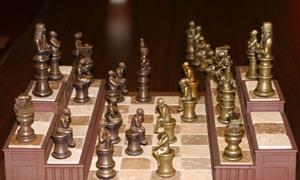Learning to play chess teaches jail inmates life strategies

Image from Shutterstock.
It might seem that learning to play chess is a good way to pass the time for those incarcerated in Chicago’s Cook County Jail.
But it’s much more than that, instructor Mikhail Korenman and some of the inmates to whom he has taught the game tell the Daily Southtown (reg. req.).
Lessons learned from chess make it easier to approach life issues strategically and take a loss with good grace, they said
“The goal is not to make them world champions,” Korenman says of the 600 inmates he has taught in the four years the program has been ongoing. “The goal is that when they get out of correctional facilities, they can use chess in everyday life, making right decisions under time pressure; winning; seeing they can do it themselves.
“I do think chess has been a great influence to this group of people.”
Ernest, a 42-year-old inmate, said the patience and discipline he learned playing chess helped him earn his high-school equivalency diploma. When he is released, he plans to teach the game to his children and hopes to participate himself in tournaments.
“A lot of us is raised where we don’t have the role models in our lives. We don’t have anybody teaching us; showing us these types of games and explaining it to us that, ‘Hey, this could better you,’” he told the newspaper.
As a condition of reporting the story, the Southtown agreed not to publish full names of inmates or their criminal histories.
Special events organized in conjunction with the class included having a chess grandmaster play 10 games simultaneously against prisoners—while blindfolded, reports an earlier CBS Chicago story.
Sheriff Tom Dart said learning the game helps teach inmates not to act impulsively, a problem for many of them.



